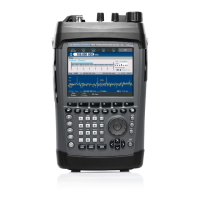TRACe|DATA
. :UDP
. . :DEFault
. . . :FLAG
. . . . :OFF <ip-address> , <ip-port>, <flag> {, <flag>}
Changes the UDP-address of the default address and removes the specified
flags if present.
Parameters:
<ip-address> string representing IP dot notation of IP address (e.g.
172.17.75.18)
<numeric_value> integer port number in the range [0,65535] (16 bit)
<flag> See Table 20 for flags in Section 12.1.
*RST state:
The “*RST” command has no effect on these settings.
After a power down, the UDP-address list only contains the default entry
(index 0). The default is retained.
Example:
TRACe:UDP:DEFault:FLAG:OFF “123.456.789.012”, 5555, “VOLT:AC”,
“SWAP”
TRACe|DATA
. :UDP
. . :DEFault
. . . :FLAG
. . . . [:ON] <ip-address> , <ip-port>, <flag> {, <flag>}
Changes the UDP-address of the default address and adds the specified flags
that determine what data is included in traces. In case a flag is added to the
default address that has tags that are incompatible with this flag (e.g.
“FSTRength” flag and AUDio tag), these flags are ignored for those tags.
Parameters:
<ip-address> string representing IP dot notation of IP address (e.g.
172.17.75.18)
<numeric_value> integer port number in the range [0,65535] (16 bit)
<flag> See Table 20 for flags in Section 12.1.
*RST state:
The “*RST” command has no effect on these settings.
After a power down, the UDP-address list only contains the default entry
(index 0). The default is retained.
Example:
TRACe:UDP:DEFault:FLAG:ON “123.456.789.012”, 5555, “VOLT:AC”,
“SWAP”

